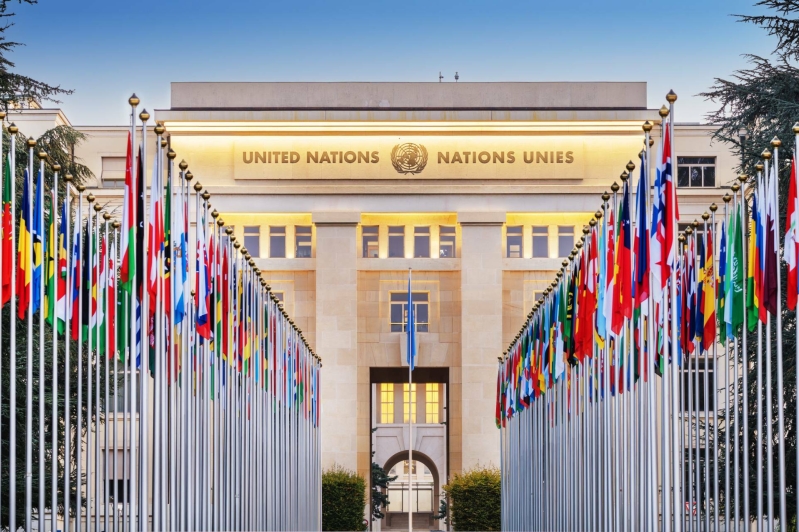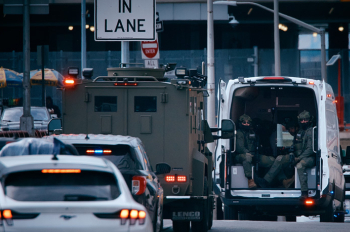
The World Evangelical Alliance has been advocating to the United Nations since the 1990s and many Christians ask us “Why bother?” It reminds me of the question that Nathanael asks in John 1:46, “Can anything good come from Nazareth?” As Philip responded, so will I, “Come and see.” Let me take a few moments of your time to show you what we are doing at the UN and the difference it makes.
The United Nations was formed in the aftermath of World War II. It was intended to be the peace broker for the world to avoid further global conflicts. In the 80 some years since the UN Charter was signed, we have not had a World War III, but we are far from a peaceful world.
The United Nations is a man-made institution. It is where the nations of the world gather to try to solve global problems, peace being one of the primary problems but not the only one. However, it is only as effective as the nations that come together. As you can imagine, Russia, China, North Korea, Sudan, and Venezuela are not particularly open to advice, and, to be fair, not many countries in the world like to be told what to do by friendly or not-so-friendly world neighbors.
So we come back to the question, “Why bother with the UN?”
First of all, where the nations gather is a place where Christians should be. It is inspiring, and just a bit daunting, to be in the room with representatives of every nation!
Second, the United Nations invites “civil society”, meaning non-governmental organizations, to participate in many aspects of its work. Fortunately, it recognizes that governments do not solve all the world’s problems by themselves; there are many non-governmental organizations that are key to providing education, humanitarian assistance and medical care around the world.
Religious organizations are part of civil societies helping to solve the world’s problems. Of course, churches go beyond practical assistance to also providing spiritual care. As one church leader recently said to me, “In Africa, we don’t have to convince churches to care for refugees; refugees come to churches for assistance!”
Because we are engaged with practical assistance, the global Church does a lot in the “hard places” on the planet and so has a lot to say about how to help the most vulnerable. Should we keep that to ourselves? Or should we share it with the nations to help make better decisions?
I should note that the Vatican, through Caritas, and the World Council of Churches, both engage at the United Nations. Indeed, the Holy See has permanent observer status and can participate in some policy-making at the United Nations, and the World Council of Churches has offices in New York and Geneva to influence United Nations decision-making.
So, if there is a chair at the table of the United Nations with “World Evangelical Alliance” (WEA) on it, allowing the evangelical Church to participate, and we have something to contribute to the global discussion, are we not called by God and by the nations of the world to be there, in that seat, participating?
The three pillars of the United Nations—its core functions—are peace-building, human rights and development. Christians have something to contribute in all these areas. As followers of the Prince of Peace, we engage in peace-building. Believing deeply in human dignity, we support human rights. Finally, Christians engage in and support development around the world that lifts people out of financial and spiritual poverty and gives them a future.
Let me share some examples of how WEA has been able to make a difference.
Summit of the future
Five years ago, at the time of the 75th anniversary of the United Nations, member states of the UN asked the Secretary General to develop ideas on how to respond to current and future challenges. We all know that there has been considerable criticism of the UN for not being able to fulfill the vision set forth back in 1945. The milestone anniversary was a good opportunity to evaluate and recalibrate.
The Secretary General of the UN, Antonio Guterres, responded with a report titled “Our Common Agenda.” Following the report in 2021, member states of the UN agreed to hold a "Summit of the Future" to: reaffirm the UN Charter, reinvigorate multilateralism (many countries making mutually beneficial decisions together), boost implementation of existing commitments, agree on solutions to new challenges, and restore trust.
Guterres says of the Summit: “This once-in-a-generation opportunity serves as a moment to mend eroded trust and demonstrate that international cooperation can effectively achieve agreed goals and tackle emerging threats and opportunities.”
A centerpiece of the Summit is the Pact for the Future, which States adopted in New York on September 22, 2024, which renews their commitment to the UN and it foundational purposes.
Back in February, 2024, when I looked at the first draft of the Pact for the Future and saw no mention of religion or faith at all, I saw that it was going in the wrong direction and missing a critical element of what it means to be human. As someone engaged in advocacy at the UN for the World Evangelical Alliance, I see the benefit of faith communities for the common good of the world.
How could I, as one Christian, make a difference in the Pact for the Future? Watch and learn...
There was a big UN event coming up in Nairobi, Kenya in May 2024 that looked quite promising for making a difference: the UN Civil Society Conference, and it was focused on the Summit of the Future! I submitted an application to attend on behalf of the WEA.
I set about trying to find Christians or people from other faiths who would have an interested in ensuring that faith, as a single focus, was included in the Pact. I kept running into dead ends—no one I knew was going to the conference and no one seemed to care about the importance of faith as a driver of the common good.
Was it the Holy Spirit, that urged me on? Was it technology that is ubiquitous in our lives today? Then it hit me. Why not use the great connector in today’s world—a WhatsApp group? And that’s where it started! Now the group has over 65 members from faith-based NGOs and has taken on a life of its own.
In Nairobi, I suggested some places in the Pact for the Future where the wording could be changed to include faith perspectives. The group approved and we started lobbying states, where the language was being negotiated.
I passed along the recommendations to our WEA New York team and they passed it out when visiting diplomatic missions.
In the end, all those recommendations were included and are now part of the Pact. It is the first time that faith-based organizations are specifically mentioned in a visionary UN document!
Again, why is all this important? If this is indeed a once-in-a-generation opportunity to recalibrate the United Nations, it is vital that contribution of faith-based organizations is acknowledged, and faith perspectives are included. Otherwise, faith itself might easily be excluded. And besides, faith-based groups have some good ideas to contribute to hope for the future of the planet.
We want to be at the table; not standing outside looking in through a window.
Now that States have adopted the Pact for the Future, everyone can call upon the UN and individual States to live up to the obligations in the Pact. That includes working with faith-based organizations, fighting discrimination based on religion and fostering inter-faith dialogue to de-escalate conflict.
Let me give you a second example of the WEA’s work at the UN, this time in Geneva. The Human Rights Council (HRC) sits in Geneva for one month three times a year—in February, June and September. While there are plenty of reasons to critique the HRC, there are significant opportunities to highlight human rights issues at each one of these sittings.
Mid-way through the September session WEA was already making an oral statement in the HRC highlighting the plight of religious minorities in situations of conflict, focusing on Afghanistan, Nigeria and Sudan. We made another statement on challenges of churches in Sri Lanka. A third statement was written by WEA's Global Freedom Network and affirmed a recommendation for fair treatment for incarcerated workers. Not to mention statements on India, Yemen and Eritrea. In each of these statements, we highlight the persecution of Christians, and other religious minorities.
It is fair to ask what difference these statements make. Representatives of all the States are sitting in the HRC chamber when we make these statements. No country likes to be called out for human rights violations. While we make every attempt not to “name and shame” but rather to encourage states to address our concerns, no doubt, states want to minimize the number of times someone refers to human rights violations in their countries.
There are numerous smaller sessions and events held on the periphery of the HRC that provide excellent opportunities to meet policy advisors from many countries. Some countries are allies in promoting religious freedom. Other countries are places where Christians are marginalized or face discrimination. Often, the country representatives in Geneva have good connections in their governments and can help get our message to the very people we want to influence!
So, why advocate at the United Nations? First, because we can! Second, because we must. Third, it makes a difference. God is opening doors for evangelical Christians to take our place alongside other Christian representatives and representatives of other faiths. And yes, with reference back to the answer to the question Nathanael asked, something very good did come out of Nazareth. Maybe the same will be able to be said from what comes out of United Nations in New York, Geneva, Bonn, and elsewhere thanks to the voices of faith-based organizations like WEA.
Janet Epp Buckingham is Director of the WEA Office to the United Nations in Geneva. Janet is a Professor of Political Studies at Trinity Western University with a research focus on religious freedom law in Canada and internationally. She is also the Co-Director of the International Institute for Religious Freedom (Vancouver). She has a doctorate in Public Law from the University of Stellenbosch, South Africa.





